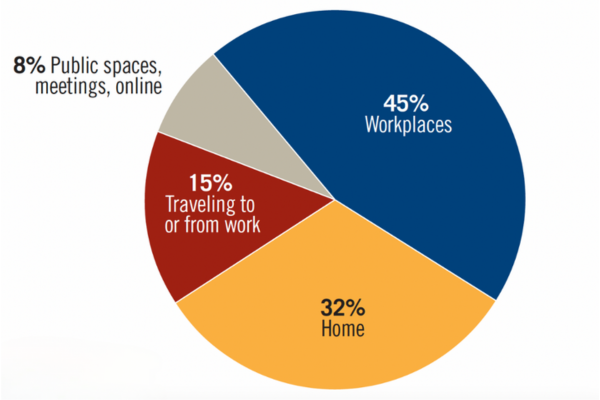Sexual harassment can happen to anyone, regardless of age, gender, or occupation. Sexual harassment can occur in any work environment, from a bustling office to a quiet shop. Know your rights, available support, and steps to address workplace sexual harassment.
What is sexual harassment in the workplace?
Sexual harassment is any unwelcome conduct of a sexual nature that occurs in the workplace.
'Unwelcome conduct' refers to any behaviour that you have not agreed to and that causes you discomfort. Any unwelcome sexual behaviour, even if it happens just once, can be considered sexual harassment.
Sexual harassment is explicitly forbidden and considered a form of unfair discrimination and prohibited on the grounds of sex, gender, or sexual orientation.
What type of behaviour can be considered sexual harassment?
Sexual harassment includes any behaviour of a sexual nature, whether physical, verbal, or non-verbal.
Physical behaviour: This involves any sexual or physical contact between you and another person. Examples include inappropriate touching.
Verbal behaviour: This covers sexual suggestions, hints, comments, jokes, whistling, communication with sexual content, remarks, or blatant requests for sex in exchange for work-related favours, for example, promotions or salary raises. Examples include sexually suggestive comments and inappropriate remarks about your body.
Non-verbal behaviour: This involves gestures, indecent exposure, or sexually explicit pictures. Examples include showing private parts and sending sexually graphic content.
The sexual behaviour must be unwelcome.
Unwelcome behaviour is anything that makes you feel uncomfortable or that you do not agree to. It can be hard to address, especially if it’s coming from a boss or senior employee. You can show that the behaviour is unwelcome by expressing your discomfort verbally through body language or in any other clear way.
Just because you were okay with a certain behaviour in the past does not mean it is always welcome. If someone's behaviour towards you causes discomfort, disrespect, intimidation, or humiliation, it constitutes sexual harassment, regardless of their intentions. Your feelings and dignity come first.
Is it still considered sexual harassment if I agree because I felt I had no other option?
You have experienced sexual harassment even if you agreed to engage in behaviour of a sexual nature because you felt intimidated or afraid for your safety or job or if a person in authority rewarded only those who responded to their sexual advances.
What laws protect me against sexual harassment?
Sexual harassment is a form of unfair discrimination prohibited by the Constitution, the Labour Relations Act, and the Employment Equity Act (EEA).
The Code of Good Practice on the Prevention and Elimination of Harassment in the Workplace aims to eliminate all forms of workplace harassment by guiding the policies and procedures to be implemented when harassment occurs.
South Africa ratified ILO Convention 190 (C190), which is the first international law to establish the right of everyone to a world of work free from discrimination and violence, including gender-based violence and harassment.
Additionally, employers are required to create a safe working environment and enforce a policy against sexual harassment.
What are my labour rights about sexual harassment?
You have the right to:
- A workplace free from sexual harassment.
- Be treated with dignity and respect.
- Equal treatment without discrimination.
- Report sexual harassment without fear of victimisation.
- Have your complaint treated seriously and confidentially.
Where can I find advice and support for dealing with sexual harassment?
If you are unable to confront the perpetrator directly, employers should provide access to a trade union representative or an outside professional for confidential advice and support.
When should I report sexual harassment to my employer?
If you experience sexual harassment, report it to your employer as soon as possible. You can’t be punished for reporting it in good faith, even if you were afraid to report it sooner. You can report it directly to your employer or through someone you trust, such as a friend, colleague, union representative, or human resources official. Review your workplace sexual harassment policy to understand the reporting options available to you. You can tell your employer if you’re not comfortable with the provided reporting methods.
Ways to address sexual harassment at the workplace
Informal approach
You can take an informal approach to address sexual harassment by asking your employer to inform the harasser about their behaviour without conducting a formal investigation or taking any formal action.
Request the individual to stop the actions that are causing discomfort. If necessary, have a trusted person accompany you.
Record the behaviour and write to the harasser requesting them to stop. Retain a copy of the letter and send it using a method that provides proof of delivery.
Request someone else to intervene. You can ask a shop steward or a trusted colleague to speak to the harasser on your behalf.
Formal approach
You can use the formal approach with or without first using an informal approach. Your workplace policy or collective agreement will outline the internal processes for investigating the complaint and taking action.
This should outline:
- Whom to lodge the grievance with
- Time frames for addressing the grievance
- Procedures for unresolved cases, including referral to the Commission for Conciliation, Mediation, and Arbitration (CCMA) and, if necessary, the Labour Court.
If there’s no workplace policy or collective agreement, discuss with your employer how the complaint will be addressed.
Steps for the formal approach
Filing the complaint:
Describe the incident of sexual harassment.
Provide the name of the harasser.
Specify the action you want the employer to take.
Investigation
Interviews: You, the accused, and any witnesses will be interviewed and may need to provide written statements.
Evidence: Collect relevant documents, such as emails or messages, that can serve as evidence.
Hearing: After the investigation, a hearing will be conducted by a chairperson (either from the company or an external party) where both sides can explain their accounts.
You have the right to confidentiality when it comes to an employer investigating sexual harassment complaints.
What action can be taken against the harasser?
Actions against perpetrators of sexual harassment in the workplace may include:
- Payment of compensation or damages
- Dismissal for serious misconduct
- Disciplinary action against retaliation or victimisation of the complainant.
What should I do if I'm unhappy with the outcome?
You can refer a dispute to the Commission for Conciliation, Mediation and Arbitration (CCMA) and then the Labour Court for unresolved CCMA disputes. Approach the court within 30 days of receiving the commissioner’s certificate.
What should I do if a client or customer harasses me?
Employers must handle harassment from clients or customers properly to maintain a respectful and safe workplace. While employers can’t discipline non-employees, they must support their staff and take complaints seriously.
Can I lay criminal charges for sexual harassment?
A survivor of sexual assault has the right to press separate criminal and/ or civil charges against an alleged perpetrator. The Criminal Law (Sexual Offences and Related Matters) Amendment Act, 2007 (Act No. 32 of 2007) covers such areas as rape and sexual/indecent assault.
Can I apply for a protection order against the harasser?
Yes, you can apply to the court for a protection order. This order outlines actions the harasser must or must not take to prevent further harassment. The process follows the guidelines in the Protection from Harassment Act.
You might like:
An example of workers taking action to develop solutions to end GBVH in the world of work – Garment factories and retail stores.
"98% of women workers in garment factories and clothing stores surveyed reported experiencing gender-based violence or harassment."
In Their Own Words: Workers address gender-based violence and harassment in South Africa’s garment factories and clothing retail stores
Where GBV happens
Sources:
Sexual harassment | Decisions For Life for young women
A simplified guide to sexual harassment | Women’s Legal Centre








